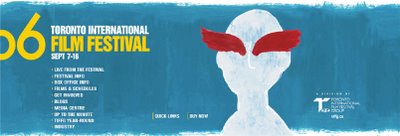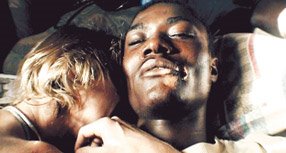 After reading yesterday’s commentary on the film Death of a President, a few of my Canadian friends emailed to recommend what they consider to be a film far more worthy of my attention. The film, Ghosts of Cité Soleil, documents life in Haiti during the last days of the beleaguered presidency of Jean Betrand Aristide, which was dominated by gang warfare. And it premiered at the Toronto Film Festival on Monday, reportedly to unqualified acclaim from the audience, which included many politically-active celebrities like Danny Glover (of the Lethal Weapon movies).
After reading yesterday’s commentary on the film Death of a President, a few of my Canadian friends emailed to recommend what they consider to be a film far more worthy of my attention. The film, Ghosts of Cité Soleil, documents life in Haiti during the last days of the beleaguered presidency of Jean Betrand Aristide, which was dominated by gang warfare. And it premiered at the Toronto Film Festival on Monday, reportedly to unqualified acclaim from the audience, which included many politically-active celebrities like Danny Glover (of the Lethal Weapon movies).
Of course, my friends knew I would be interested because, for years, they’ve been hearing and reading my lamentations on the civil strife that has made Haiti an ungovernable mess for decades. Indeed, to get a sense of what my political rants about this god-forsaken country entailed, I invite you to click here to read my article entitled Haiti’s Living Nightmare Continues…Unabated!, here to read The Plague of Haitian Refugees in the Caribbean, and here to read Yo Bush! Never mind Iraq and Lebanon, what about Haiti?
Nonetheless, as much as I appreciate the reviews of my Canadian friends (Haitian immigrants amongst them), I am loath to recommend a film I have not seen. Therefore, I shall suffice to reprint the official review by Thom Powers and encourage you to see it when it comes to a cinema near you (or when it’s released on DVD, which may well be simultaneous).
 Executive Producer: Kim Magnusson, Cary Woods, George Hickenlooper, Jerry Duplessis, Wyclef Jean
Executive Producer: Kim Magnusson, Cary Woods, George Hickenlooper, Jerry Duplessis, Wyclef Jean
Producer: Mikael Chr. Rieks, Tomas Radoor, Seth Kanegis
Written By: Asger Leth
Cinematographer: Miloš Loncarevic
Editor: Adam Nielsen
Production Designer: Asger Leth
Sound: Hans MøllerMusic: Wyclef Jean, Jerry Duplessis
Principal Cast: Winson Jean (a.k.a. 2pac), James Petit Frère (a.k.a. Bily), Éleonore Senlis (a.k.a. Lele), Wyclef Jean
Meet 2pac and Bily, brothers with broad smiles and big guns. In the Haitian slum of Cité Soleil, 2pac and Bily are among a cadre of notorious gang leaders whose foot soldiers are known as chimères, or ghosts. Former Haitian President Jean-Bertrand Aristide reputedly employed the chimères to attack his opponents. Director Asger Leth had remarkable access to this gang culture in the months leading up to Aristide’s overthrow in 2004. The resulting film is a Caribbean epic of family, love and violence.
2pac and Bily have big aspirations that sometimes collide. They both fall for the same woman, Lele, a French relief worker; she’s drawn to them even as she recognizes their “power over life and death, including mine.” 2pac and Bily sometimes skirmish with each other’s soldiers. When everyone carries a gun and a spliff, tensions can escalate in a heartbeat.
Allegiances constantly shift: between 2pac and Bily, gang leaders and politicians, Aristide and the rebels. Bily wants to go legit and join Aristide’s Lavalas political party. 2pac is fed up with Aristide; he dreams of giving up guns and battling with rap lyrics instead. (Indeed, he takes his name from Tupac Shakur.)
In Ghosts of Cité Soleil, the camera achieves an astonishing intimacy, from bedroom romance to street warfare. The colours are saturated, with heat radiating from every surface. The director knows this country well: his father, Jørgen Leth, has made films in Haiti since the early eighties and lived there since 1991.
Wyclef Jean collaborates on the haunting score and also appears in the film. From Haiti, 2pac calls Jean on the phone in New York City. Cameras capture both ends of this conversation between two modern Haitian legends. It’s one of several points where the viewer might wonder, Is this for real? The larger-than-life drama of Haiti seems a world away from the comfort and security of the United States. When Jean gets off the phone, he remarks, “That ain’t no Hollywood movie, that’s just the truth.”
– Thom Powers
NOTE: “Asger Leth has made several short films including Gala (96) and Again. Today (97) and worked as assistant director on Jørgen Leth’s documentary short New Scenes from America (02). He also was a writer and assistant director on Jørgen Leth and Lars von Trier’s feature documentary The Five Obstructions (03), which screened as part of the Festival’s Real to Reel programme. Ghosts of Cité Soleil (06) is his first feature-length film.”
Haitian film, Ghosts of Cité Soleil, Wyclef Jean
Leave a Reply
You must be logged in to post a comment.